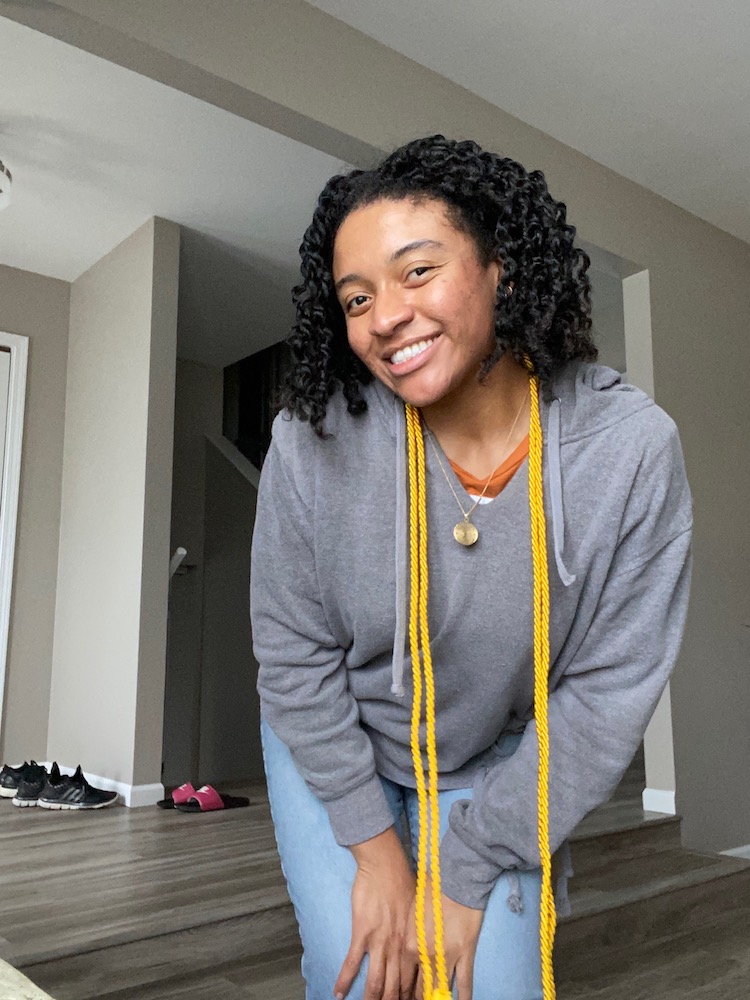For this ASU grad, it’s the climb
As a recent health entrepreneurship graduate, Erika McClinton reflects on her years at ASU fondly. From 12-hour long school days to napping in the Cronkite building, she has had the full college experience and is ready to take her education to the next level.
McClinton was forced to deal with unforeseen bumps in the road, including not graduating when she thought she would and having her last semester interrupted by COVID-19. But she’s accepted the change of plans and is happy to be spending extra time with family in Indiana. No matter the curveballs that have been thrown her way, she is willing to make the best out of a difficult situation. She encourages Sun Devils to “live in the moment,” because college goes by fast.

ASU graduate Erika McClinton
McClinton’s worth ethic, perseverance and can-do spirit are qualities that are sure to take her well beyond her next chapter of life. She’s weathered through many storms in her academic career, and she said her journey is what she’s most proud of. The GREs and physician assistant school better be scared.
As she prepared to graduate, McClinton shared some of her reflections and advice for Sun Devils.
Question: What was your “aha” moment, when you realized you wanted to study the field you majored in?
Answer: I’m not sure that I had a specific “aha” moment because with my college experience, it seemed to force me to be very “go with the flow.” One moment that helped lead me toward the health entrepreneurship track was ironically not getting accepted into ASU’s nursing school. This allowed me to look at my options and really understand that there are so many more career options than nursing. It’s weird to say, but I’m so glad that I did not get accepted into nursing school. I have learned so much more about myself and life in general by not being accepted.
Q: What’s something you learned while at ASU — in the classroom or otherwise — that surprised you or changed your perspective?
A: While at ASU, I’m not sure what surprised me, but I had a huge appreciation for learning more about everyone’s culture and the history of Arizona, since it’s such a new state. At the high school that I attended, we were predominantly African American, so learning about all of these cultures and history of Arizona was pretty cool.
Q: Why did you choose ASU?
A: I honestly chose ASU because I am from Indiana and I could not look at any more snow and did not want to be cold any longer. But when I came to visit ASU the fall of my senior year in high school, I fell in love. Everyone was so welcoming and seemed so excited to be there, which was really appealing. The heat definitely made it even more appealing!
Q: Which professor taught you the most important lesson while at ASU?
A: My lab instructor Chris Gozo (who is my manager and is the lab coordinator for anatomy and physiology downtown) taught me many things. One thing that I will always remember that he enforced among all of the A&P instructor’s aides is the importance of getting things done on time, getting it done effectively with your best work and never leaving a team member behind.
Q: What’s the best piece of advice you’d give to those still in school?
A: I would tell them to live in the moment. College flies by! I know it feels like you can’t do it and your classes are difficult, but make sure to persevere, have fun and take some time for yourself.
Q: What was your favorite spot on campus, whether for studying, meeting friends or just thinking about life?
A: On the Downtown campus, my favorite place to study was the courtyard in the law building. My favorite place to take a nap was definitely Cronkite. On the Tempe campus, my favorite place to study was honestly anywhere outside.
If I had to go anywhere to power study, it would honestly just be Fillmore Co or Starbucks. I love a good coffee shop, not even for the coffee or food. I love the ambiance.
Q: What are your plans after graduation?
A: After graduation, I plan on finishing up my prerequisites, taking the GRE and applying to physician assistant school! I can’t wait to see what the future holds!
Q: If someone gave you $40 million to solve one problem on our planet, what would you tackle?
If someone gave me $40 million dollars during this pandemic, it would easily go to coronavirus research. If we were not in a pandemic, I would want to donate that money to after-school programs for low SES (supplemental educational services) communities or inner-city schools. I think many people underestimate the power of after-school programs, clubs and athletics and the impact it has on children, especially in low-SES communities or inner-city schools.